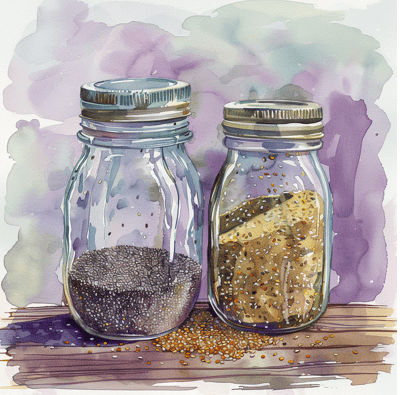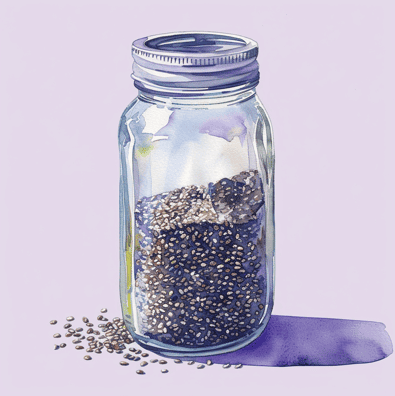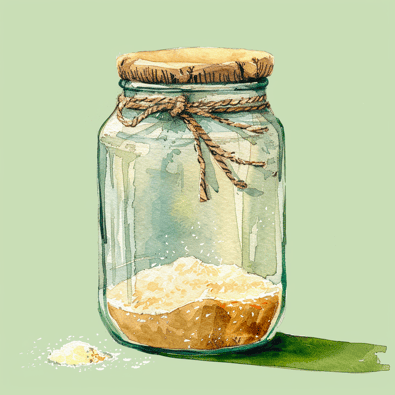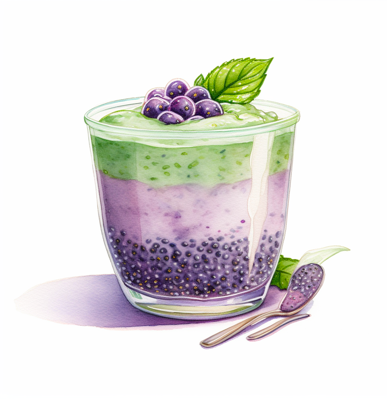
With so much conflicting advice, it’s tough to know how to choose between chia seeds vs psyllium husk. Which one will boost your skin health, make you feel great, and save you more time? Let’s clear up the confusion and find out which is truly worth it for you.
Hi, I’m Hazel
I gave up on skincare after years of issues with acne and sensitive skin.
But after going plant-based, my skin cleared up and even started to glow. Now I help women reveal their natural beauty with simple, delicious plant-based food.
I also used to be a nurse, and love nerding out on nutritional science (high-quality science, that is).

As usual, this post is based on the strongest nutritional evidence I could find with a focus on the simplest, most delicious foods
…because who has time to waste on actions that don’t work?
The quick version:
Chia seeds are rich in omega-3 fatty acids, protein, and antioxidants, offering a gel-like consistency when soaked, making them versatile for smoothies, chia pudding, and as egg substitutes. Psyllium husk, on the other hand, excels in high fiber content, promoting digestive health, stabilising blood sugar levels, and acting as a thickener in gluten-free baking. Choose chia seeds for skincare, overall nutrition and versatility, and psyllium husk for powerful digestive benefits.

Both chia seeds and psyllium husk offer unique potential health benefits and can be a great addition to your diet. Here’s a breakdown of their nutritional value and how they can help with various health conditions.
Chia Seeds
Chia seeds are loaded with essential nutrients that support your overall health.
Skincare Benefits
- Antioxidants: High in antioxidants, which fight free radicals and reduce inflammation, helping improve skin health.
- Healthy Fats: Rich in omega-3 fatty acids and healthy fats, supporting skin hydration and reducing dryness.
- Essential Nutrients: Packed with alpha-linoleic acid and essential amino acids that contribute to skin elasticity and overall glow.
Weight Loss Benefits
- Fibre: High in fibre, which helps keep you full longer, reducing overall calorie intake.
- Protein: Contains protein that supports muscle repair and growth, aiding in weight management.
- Healthy Fats: The presence of healthy fats can help manage cravings and promote satiety.

Nutritional Benefits
- Good Source of Protein: Great for muscle repair, which helps if you have an active lifestyle.
- Healthy Fats: Contains healthy fats and an excellent source of omega fatty acids, supporting heart health and reducing inflammation.
- Antioxidants: Fights free radicals and inflammation, which is great for your skin and overall health.
- Nutty Flavour: Mild taste that blends well in smoothies, chia pudding, or on the top of salads, making them an excellent option for adding nutrition to meals.
Psyllium Husk
Psyllium husk is known for its high fibre content and offers numerous benefits for the digestive system which also supports skincare and weight management goals.
Skincare Benefits
- Digestive Health: Promotes regular bowel movements and supports a healthy digestive system, which indirectly benefits skin by reducing toxins and improving overall health.
- Hydration: Helps maintain hydration levels in the body, which can benefit the skin.

Weight Loss Benefits
- High Fibre Content: Exceptional for increasing fibre intake as a dietary fibre supplement, making you feel full and reducing appetite.
- Blood Sugar Levels: Stabilises blood sugar levels, preventing spikes and crashes that can lead to overeating.
Nutritional Benefits
- Digestive health: Known for its psyllium husk fibre, boosting your fibre intake and promoting bowel movements and maintaining a healthy digestive system, which can relieve constipation and other digestive issues. Acts as a prebiotic, feeding good bacteria in your digestive tract, improving overall gut health.
- Lower Cholesterol Levels: Helps reduce cholesterol, benefiting heart health and reducing the risk of heart disease.
- Blood Sugar Levels: Stabilises blood sugar levels, which is essential for managing diabetes and preventing blood sugar spikes.
- Gluten-free Baking: Perfect for those with dietary restrictions, making it a fantastic substitute in gluten-free baking.
Practical Uses
How do we compare chia seeds vs psyllium husk in a practical way?
Chia Seeds
Chia seeds are a versatile superfood that can enhance your meals and improve your well-being.
- Easy to Use: Sprinkle on yogurt, blend in smoothies, or mix in oatmeal.
- Versatile: Perfect for making chia pudding and adding a gel-like consistency to dishes.
- Texture: Adds a gelatinous texture to foods when soaked.
- Binding Agent: Acts as a binding agent in recipes so perfect as egg substitutes.
- Nutty Flavour: Adds a mild, nutty flavour.
- Top of Salads: Great on the top of salads for added crunch.
Psyllium Husk
- Baking: Use as a thickener or binder in gluten-free baking.
- Neutral Taste: Mix into water, juice, or add to recipes without changing the flavour.
- Fibre Intake: Boosts your fibre intake effortlessly.
- Dietary Restrictions: Fits into many dietary restrictions and needs.

When to Choose Chia Seeds
For better skincare, consider chia seeds. They contain antioxidants and healthy fats that support skin health and hydration. If you need a nutrient boost with more alpha-linoleic acid and essential nutrients, or enjoy a fun texture in your meals, chia seeds are a fantastic substitute for other seeds. They are also convenient to add to everyday meals and beneficial for weight management due to their high fibre and protein content, which help keep you full longer and reduce cravings.
When to Choose Psyllium Husk
For digestive health and overall detoxification, which can benefit your skin, consider psyllium husk. It supports a regular digestive system and promotes digestive health. If you’re focusing on heart health by managing cholesterol levels or looking for help with weight management by feeling full longer, psyllium husk is a great choice. Additionally, it can be used as a psyllium husk substitute for other fibre supplements.
Chia seeds vs Psyllium husk
Both chia seeds and psyllium husk are fantastic additions to a plant-based diet. If you’re looking for overall nutrition and ease of use, chia seeds are your best option. For focused digestive health and heart benefits, psyllium husk is a great choice. By understanding the strengths of each, you can make the right decision for your health journey.
FAQ: Chia seeds vs Psyllium husk
Can you take psyllium and chia seeds together?
Yes, combining psyllium husk and chia seeds can boost fibre intake. Chia seeds provide insoluble fibre, while psyllium seed husks provide soluble fibre. This mix supports digestion and regular bowel movements. Adding them to smoothies, overnight oats, or yogurt is a nutritious way to consume both.
What works better than psyllium husk?
Alternatives like flax seeds, hemp seeds, or oat bran might be more suitable depending on your individual needs. Flax seeds and hemp seeds offer additional nutrients like omega-3 fatty acids and protein. Oat bran provides a good amount of soluble fibre and might be easier to incorporate into various dishes.
What is the downside of psyllium husk?
Psyllium husk can cause bloating and gas, particularly if consumed in large quantities without adequate hydration. Staying hydrated is crucial when consuming psyllium husk. Additionally, some individuals might be allergic to psyllium seed husks, so it’s important to monitor for any adverse reactions.
Is it ok to take psyllium husk every day?
It is generally safe to take psyllium husk daily, provided it’s consumed in moderation and with sufficient water to avoid potential digestive discomfort. Daily intake can help with regular bowel movements and digestive health. However, individual responses vary, so starting with small amounts and gradually increasing is advisable. Consulting a healthcare professional for personalised advice is recommended.
References
Most references below will link to the original peer-reviewed study itself. However, sometimes I will link to a video over at NutritionFacts.org instead, which is by far the single best resource of brutally transparent nutritional evidence you will ever see. Dr Greger tells a great story about the realities of the science and if I think you will benefit more from one of his videos, the link will take you there instead.
Happy nerding!
- Carlsen MH, Halvorsen BL, Holte K, et al. The total antioxidant content of more than 3100 foods, beverages, spices, herbs and supplements used worldwide. Nutr J. 2010;9:3. Published 2010 Jan 22. doi:10.1186/1475-2891-9-3
- Ashura, K.K., Lillian, D. K., Oscar, K., & Leonard, M. P. R. (2021). Nutritional, health benefits and usage of chia seeds (Salvia hispanica): A review. African Journal of Food Science, 15(2), 48–59. https://doi.org/10.5897/ajfs2020.2015
- Muñoz, Loreto & Cobos, Angel & Diaz, Olga & Aguilera, José. (2013). Chia Seed (Salvia hispanica): An Ancient Grain and a New Functional Food. Food Reviews International. 29. 394-408. 10.1080/87559129.2013.818014.
- Aguilar-Toalá JE, Liceaga AM. Identification of chia seed (Salvia hispanica L.) peptides with enzyme inhibition activity towards skin-aging enzymes. Amino Acids. 2020;52(8):1149-1159. doi:10.1007/s00726-020-02879-4
- Vuksan V, Jenkins AL, Brissette C, et al. Salba-chia (Salvia hispanica L.) in the treatment of overweight and obese patients with type 2 diabetes: A double-blind randomized controlled trial. Nutr Metab Cardiovasc Dis. 2017;27(2):138-146. doi:10.1016/j.numecd.2016.11.124
- Jalanka J, Major G, Murray K, et al. The Effect of Psyllium Husk on Intestinal Microbiota in Constipated Patients and Healthy Controls. Int J Mol Sci. 2019;20(2):433. Published 2019 Jan 20. doi:10.3390/ijms20020433